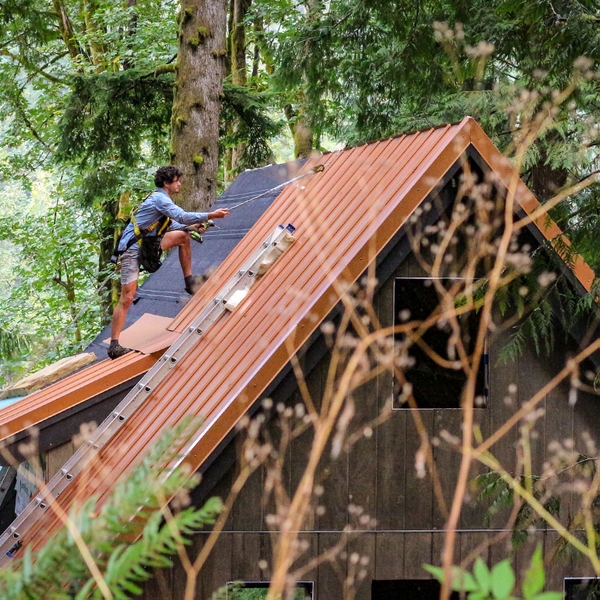We Quit Our Jobs to Build a Cabin—Everything Went Wrong
And it was also the most awesome experience
New perk: Easily find new routes and hidden gems, upcoming running events, and more near you. Your weekly Local Running Newsletter has everything you need to lace up! .
We were two or three weeks into building a cabin when the first two-by-four became the target of a sudden, white-hot flash of anger. It was the summer of 2018, in the middle of Washington’s emerald-soaked Cascade Range, and I was on the phone with my father, seeking advice about some framing conundrum, while my longtime friend Patrick (who goes by Pat) was wrestling a 16-foot board toward a miter saw. When the whir of the blade stopped, it became immediately clear that he had cut it wrong. The sawdust still airborne, Pat reached down, grabbed a two-by-four with the conviction of a Baptist preacher, and sent it flying into the forest with a short, crisp, “Fuck.”
A lot more lumber would end up in the woods. We screwed up countless times from morning to evening, wasting precious daylight hours. Constructing a cabin was a task that one might say we were “not entirely prepared for.” Sometimes, during those months of toil, our anger burned so intensely that we thought the boards we threw into the woods might never land. They’d just keep flying, the wood breaking down over time and separating into smaller and smaller pieces until they vanished, as our brains exploded from frustration and worry.
In reality, the whole project was borne out of frustration. A few months earlier, Pat and I had what were arguably good careers: I was a reporter at a national magazine in San Francisco, and Pat was a copywriter at a tech company in Seattle. We were lucky enough to have good bosses and colleagues who had become friends. But we were deskbound and felt caged by the typing, phone calls, Slack chats, and emails, all performed under the hum of fluorescent lights. We were overwhelmed by the uniformity of it all and troubled that we seemed incapable of finding contentment in jobs that many of our coworkers appeared to cherish. Sometimes we hoped for an excuse to quit—a blowup after a failed project or an absurd request from a boss.
We knew we were fortunate to have good jobs—and this was well before our country was facing a pandemic and massive unemployment—but we were facing the existential crisis that comes from spending your days doing something you don’t enjoy and wondering if this is how the next five, ten, 20 years will play out. We were in our thirties, young, but not so young. We’d seen the articles linking sedentary lifestyles to heart disease, diabetes, cancer, and misery. We wanted to get out of our respective offices and try something different.
We knew how insufferable it would sound: a couple of discontented millennials deciding to leave stable jobs to do “something more meaningful.” People would think we were a couple of wannabe Foster Huntington dropouts. But being a trope and being free seemed better than being trapped inside for the better part of our thirties.
For the past five years, we’d joked about various alternatives to our day jobs: scuba dive instructor, skydiving teacher, maybe own a cool hookah café with live music. But one option didn’t seem as ridiculous as the others: leaving our desks to build a cabin from scratch.







